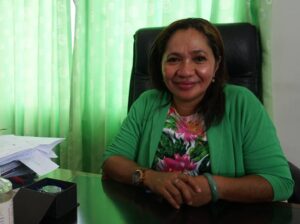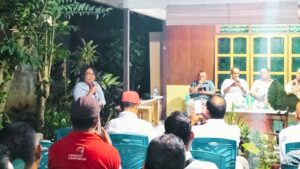The Central Executive Board (DPP) of the National Mandate Party (PAN) has jumped on the bandwagon of using social media to attract novice voters. Through their official TikTok account, they aggressively invite young people to register as legislative candidates.
A number of public figures who have many followers, such as comedian Denny Cagur, actress Gita Sinaga, and guitarist Enda Ungu, also join the campaigns using their social media. They attempted to attract public sympathy through populist issues, including by supporting micro, small and medium enterprises, and campaigning vaccination programs for the community. The content, which was displayed on February 17, received thumbs up from 116 users.
As of March 27, 2022, the TikTok account of PAN has gathered more than 15 thousand followers. Almost all videos are watched thousands of times. Through the application that is popular among young people, PAN often comments on issues that become public attention. One of them is the procurement of curtains for the official houses of members of the House of Representatives (DPR). The latest content they uploaded was a polemic related to the rejection against cleric Abdul Somad to enter Singapore. The video has been played nearly 300 times.
Deputy Chairperson of PAN’s Central Executive Board, Viva Yoga Mauladi, justified that his party was eyeing young voters through social media. In the 2024 election, the number of young voters is estimated to be more than half of the total participants in the election. “This is an enormous target,” he told Jaring.id on Friday, May 13, 2022.
Based on the data of permanent voter list (DPT) by the General Elections Commission (KPU), the number of voters in the 2019 simultaneous elections reached 192.83 million people. It consists of 190.77 million voters in Indonesia and 1.06 million voters overseas. From this figure, the voters are dominated by young people. The number of voters aged 20 years old reached more than 17.5 million people, while those aged 21 to 30 years were 42.8 million people.
The number of young voters is expected to dominate the 2024 election. Therefore, said Viva, PAN cannot help but adapt to the development of digital technology. The party believes that it must enter the world of young people who are very attached to various social media platforms, especially Tiktok and Instagram. “We will die and be left behind by potential voters if we are not being creative and innovative. PAN is aware of digital development,” he explained.
In the 2019 general election, PAN won 9,572,623 votes. With this large number of votes, the party managed to get 44 seats in the House of Representatives. Viva hopes that his party can achieve maximum results in the upcoming elections. In order to remain relevant to the needs of the community, PAN claims that it will consistently encourage cheap and quality education services. “Young people need good facilities and good service,” he said.
Another strategy taken by PAN is to form young spokespersons from the circles of millennial and generation Z. According to Viva, the formation of young spokespersons aims to provide political awareness. In addition, young spokespersons can also help parties to analyze communication patterns, political language and the character of young voters. “This is the responsibility of PAN as a political party to prevent young people from being apathetic and skeptical. They must be aware of making choices by giving their votes in the election. They should not abstain. One vote means a life for the nation in the future,” he explained.
Other parties, such as the Golkar Party, have also prepared strategies to gain public sympathy through social media. According to the chairman of the Golkar Central Executive Board (DPP), Dave Laksono, one of the strategies involves Golkar cadres, who have many followers. Among them are actress Nurul Arifin who has 91.1 thousand followers, former news anchor Meutya Hafid Ansyah (96.4 thousand), and businessman Erwin Aksa (90.4 thousand).
These three politicians often socialize the Golkar Party’s vision, as well as posting the party’s daily activities, supporting young people, and promoting a series of activities attended by the General Chairperson of the Golkar Party, Airlangga Hartarto. “The party will pursue as many votes as possible. Each vote will contribute to gaining a seat. The party’s cadres should be encouraged to draw as many votes as possible,” said Dave in a meeting with Commission I of the House of Representatives on Wednesday, May 18, 2022.
According to Dave, Golkar, together with PAN and the United Development Party (PPP) also formed a coalition called the United Indonesia Coalition on Tuesday, May 17, 2022. The voice of young people, he said, was one of the targets in forming the coalition. “This is crucial to win the 2024 Regional Head Elections and Presidential Elections,” Dave said excitedly.
Even so, the three coalition parties have not yet determined which presidential and vice presidential candidates will be nominated in the 2024 election. Golkar itself has decided to nominate the Coordinating Minister for the Economy, Airlangga Hartarto, as a presidential candidate. “This decision was taken by all Golkar cadres throughout Indonesia during the 2019 National Conference. Therefore, to follow up this decision, we are communicating with PPP and PAN cadres throughout Indonesia,” said Dave.
However, Airlangga’s electability still needs to be improved. Based on the results of the Indonesian Political Indicators survey from April 14 to 19, 2022, Airlangga’s electability is still less promising.
The desire of some political parties to persuade young voters from the circles of millennial and generation Z is very reasonable. The results of the 2020 Population Census conducted by the Central Statistics Agency show that the majority of Indonesia’s population is dominated by young people. The proportion of Generation Z (which was born between 1997 and 2012) was 74.93 million people or 27.94 percent of the total population, followed by millennials (those who were born between 1981 and 1996) that reached 69.38 million people or 25.87 percent of the total population. Meanwhile, Indonesia’s population stood at 270.20 million in total as of September 2020.
Parties should implement clear programs
Political communication observer from Paramadina University, Hendri Satrio, said that it was natural for political parties to compete to gain influence from social media to attract young voters. This is because their number is quite large in the 2024 election. However, he said, it is not enough to grab the attention of the youths by simply appearing on social media. “It might be significant to raise the popularity of the parties. However, to hope that the parties will be elected simply by campaigning on social media, they must think again and find another strategy,” Hendri said in an online interview on Monday, May 23, 2022.
According to Hendri, political parties should consider implementing a two-way communication model. They also need to touch the issues that are related to the young voters’ families by presenting substantial contents or programs, such as providing jobs, facilitating the procurement of cheap basic necessities. “So, the parties should not only fight for the young people, but for their families too,” he said.
Another thing that the parties should consider is providing the space for young voters to be creative. Without all of that, Hendri said, it would be difficult for political parties to get the attention of novice voters. “Give them a chance. They are the generation that likes to be given the opportunity the most,” he said.
One of the voters, Dhea Kinanti (24), assessed that political parties are not serious about consistently inviting young people to express their voting rights. So far, the attitude of political parties is considered not supportive of the aspirations of young people. One of the examples, she highlighted, is the parties’ stance on the demonstrations to reject ‘the corrupted reform’ and the passage of Law on Sexual Violence Act (TPKS Law). Even though the law has been passed, Dhea sees that the parliament and political parties are not serious in pushing for the ratification of the TPKS Law. As a result, it will take years for the regulation to become law. “I hope that the aspirations of young people can be taken into account,” said Dhea on Wednesday, May 10, 2022.
However, Dhea still wants to exercise her political rights in the 2024 election. However, she still has no idea about which candidate and which party to choose. “I don’t think about abstaining. I still have the desire to contribute for a change by voting,” she said.
Meanwhile, Bintang Putra (27), said that the contents of political parties that are widely broadcasted on social media have yet to represent his interests. “I still don’t get their message. They mostly only dance. I’m thinking of abstaining,” Bintang told Jaring.id when contacted by telephone on Wednesday, May 10, 2022. Of the various issues being raised, according to him, the parties rarely bring on the issues of free education, cheap housing, living wages, and job security. “So, I feel that the message is not relevant to the needs of young people,” he said.
Yngvie Ahsanu Nadiyya, who in 2024 will take part in the election for the second time, feels the same way. She made it clear that she was not interested in voting for a political party that merely involved a celebgram to gain support. “I’m not interested in voting if they can only produce such content,” she said.
Exposure of a figure
Southeast Asian political observer and lecturer in International Relations at Pelita Harapan University, Yosef Djakababa, said that figures are still an important factor to attract the attention of people living in Southeast Asia, including Indonesia. Meanwhile, social media functions as an exposure tool to strengthen the positive side of certain figures. “The system may be democratic, but the same candidate appears. They are from the same group,” he told Jaring.id to Jaring.id on Saturday, May 28, 2022.
The victory of Ferdinand “Bongbong” Marcos Jr. in the Philippines, he said, was the result of decades of campaigning. The campaign is considered to be able to improve the public image of the Marcos family. The result was evident on Monday, 9 May 2022, when Ferdinand Marcos Jr. won in the quick vote count. He pocketed 30 million votes or 96 percent of the vote.
Marcos Jr.’s victory is somewhat of an irony for the Philippines. This is because the Marcos dynasty was previously overthrown in large demonstrations in 1986 on charges of corruption, human rights violations, and a dictatorial leadership for two decades. “Bongbong won again despite the bad reputation of his family. They are the Marcos family—a political family, starting from the children, the mother, the nephews, the cousins. They build a family political culture. They are never out of politics. Their followers are also solid,” he explained.
This was then strengthened by the condition of the Philippines, which was facing the domination of young voters—who had not experienced the Marcos dictatorship firsthand. Yosef said that not a few of them are trapped in the narrative of the pro-Marcos camp on Facebook, YouTube, and TikTok about the golden age of Marcos’ leadership.
In addition, according to Yosef, the victory of Marcos Jr. could not be separated from the unification of two other political dynasties. “In the Philippines, many young leaders support Bongbong because of the Duterte factor,” he said.
A similar condition occurs in Timor Leste. The country that held its presidential election last April resulted in José Ramos-Horta becoming the winner. With a victory of 397,145 votes or 62.09 percent of the total votes, Horta walked as the winner, thanks to the support of Xanana Gusmao and the National Congress Party for the Reconstruction of Timor Leste (CRNT). Meanwhile, the incumbent, Francisco Guterres “Lú-Olo”, who is supported by the Fretilin Party, only garnered 242,440 votes or 37.91 percent of the total votes.
One of the presidential candidates in the election is Virgilio Silva Guterres. According to him, José Ramos-Horta’s victory could not be separated from Xanana’s popularity. “He is popular because he wants to come down to help small communities. He goes to the community and takes a selfie with them. He is the choice of the young people, not because of awareness, but because of the figures,” said Virgillio to Jaring.id on Friday, May 20, 2022.
In the last presidential election, Virgilio admitted that he had used social media to capture people’s votes, especially novice voters, by making the most of Facebook, Twitter and YouTube. According to him, Facebook is the most popular platform in Timor Leste. Users of the platform are estimated to reach around 300 – 400 thousand people. “I don’t have the human resources to cover all areas. I only use community radio, social media, and Youtube,” said Virgillio. But still, he could not match the popularity of Horta. “Xanana and his party are considered as the main organization that contributed a lot during the struggle of Timor Leste. In remote areas, voters choose candidates based on their emotional connection,” he said. (Abdus Somad)







